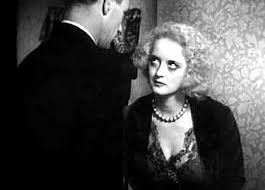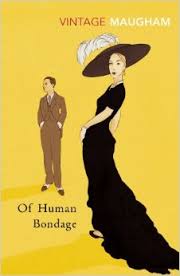Of Human Bondage
by Somerset Maugham
1915
The 100 best novels / No 44 / Of Human Bondage by W Somerset Maugham (1915)
Customer in hairdressers: “What’s that book you’re reading, love?”
Rita: “Somerset Maugham, ‘Of Human Bondage’“.
Customer in Hairdressers: [knowingly] “Ohh, my husband’s got loads of books like that.”
(Educating Rita (film) 1983)
Somerset Maugham isn’t read very widely nowadays, despite having been a central figure in English writing for a large chunk of the twentieth century, and despite this name-check in Willy Russell’s much-loved play. My evidence for this sweeping statement is limited, of course, but certainly he is much neglected by film and television companies, which is one way nineteenth and twentieth century writers gain a new audience. I think the main reason must be the dated, slightly faded air of his work – if, that is, ‘Of Human Bondage’ is anything to go by.
‘Of Human Bondage’ is yet another bildungsroman. In the foreword Maugham describes it as “not a biography, but an autobiographical novel; fact and fiction are inextricably mingled”. The Maugham figure is a rather shabby anti-hero, the orphan Philip Carey. Philip has a club foot and a sensitive nature. Losing his parents to the illnesses that carry characters in literature off so very easily, he is sent to live with his aunt and uncle in the thinly disguised “Blackstable”. Philip is then sent to boarding school in nearby “Tercanbury”, (why bother to change the town’s name so pointlessly – was it on the advice of lawyers perhaps? The school is not portrayed particularly sympathetically, but it is not Lowood College either!) . Philip’s uncle and aunt want him to go to Oxford and become a vicar, a calling suited to his precisely located lower middle class status, but he rebels, entering on a series of ill-considered and fruitless adventures. He goes to Germany to learn the language, but this comes to nothing. He then tries to become an accountant but doesn’t enjoy it. He tries to study art in France, but eventually realizes that he will never be good enough. On returning to England he starts to study medicine, but has to drop out when he loses all his money on some reckless speculation.
Philip’s romantic adventures are consistently unfortunate. In France a fellow art student develops an unrequited passion for him, and eventually commits suicide. In London he falls desperately in love with Mildred, a tea shop waitress, but she is an appalling woman who prefers prostitution to being with him. He has a rebound relationship with a writer, but drops her quickly when Mildred reappears. Eventually Philip’s personal life begins to settle from the traumas of his earlier years, as he is befriended by the eccentric family man, Thorpe Athelny, and his financial crises are finally resolved with the death of his uncle, and a modest inheritance. The novel closes on a slightly false “happy ever after” note, as Philip becomes engaged to Thorpe’s eldest daughter, Sally, even though this involves him abandoning his dreams of travelling the world as a ship’s doctor.
The three films of this novel, most memorably the Leslie Howard & Bette Davis version illustrated here, all sensibly edit out most of the story, starting instead with Philip’s time in France, and focusing on the poisonous relationship with Mildred, which forms the heart of the novel.
Maugham took the title of this novel from Spinoza. In the ‘Ethics’ Spinoza argued that man’s inability to control his emotions constituted a form of bondage. It is possible that Maugham may have been thinking of his homosexuality in the same way when he wrote this novel – as an uncontrollable feeling that felt like an imprisonment. Being gay in Edwardian England must have felt at times like being incarcerated. The ending of this novel, when Philip accepts that his long held desire to travel is a hopeless dream, and he has to settle for marriage to a woman he has just told the reader he does not love, may reflect the internal struggles Maugham faced.
 Although I have said the novel feels dated, to readers at the time it would obviously not have felt that way. Maugham has a frank approach to pre-marital sex – while it is never explicitly mentioned, and various euphemisms are used, the novel is very clear that Philip has sex with his various girlfriends, that Mildred becomes a prostitute, and that she contracts a venereal disease. This novel marks the transition from the Victorian novel where even suggesting men and women have sex with one another was taboo, to acknowledging its existence, however tangentially, and then to finally bringing it into the open in the 1930’s and beyond. This novel makes an interesting contrast with ‘The Rainbow which was published in the same year.
Although I have said the novel feels dated, to readers at the time it would obviously not have felt that way. Maugham has a frank approach to pre-marital sex – while it is never explicitly mentioned, and various euphemisms are used, the novel is very clear that Philip has sex with his various girlfriends, that Mildred becomes a prostitute, and that she contracts a venereal disease. This novel marks the transition from the Victorian novel where even suggesting men and women have sex with one another was taboo, to acknowledging its existence, however tangentially, and then to finally bringing it into the open in the 1930’s and beyond. This novel makes an interesting contrast with ‘The Rainbow which was published in the same year.
There is equally a frank approach to religion which in 1915 would have had much more of an impact. Philip becomes an atheist in the course of the novel, and the descriptions of his dawning realisation that there is no god are some of the most lyrical passages in the book:
“Man, no more significant than other forms of life, had come not as the climax of creation but a physical reaction to the environment…There was no meaning in life, and man by living served no end. It was immaterial whether he was born or not born, whether he lived or ceased to live. Life was insignificant and death without consequence” (601)
Finally, a quick word about anti-Antisemitism in this novel. It is almost standard in novels of this period, such as when it appears, along with racist or derogatory comments about black and Asian people; it is easy to pass it by. And it doesn’t play a significant part in this novel. But comments such as “the undertaker was a little fat jew with curly black hair, long and greasy, in black, with a large diamond ring on a podgy finger” (479) play to all the lazy racist stereotypes of the time. They leave a really unpleasant taste. I am not arguing for sanitising works of this kind, because that is a slippery slope, but it is the casual nature of the offence which is so obnoxious.
THE READING BUG



No comments:
Post a Comment